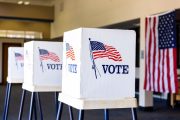
Federal and state governments are granting de facto U.S. citizenship to the children of foreign diplomats, trespassing the clear intent of the 14th Amendment to the U.S. Constitution.
That’s the latest from the Center for Immigration Studies in its backgrounder, “Birthright Citizenship for Children of Foreign Diplomats?”
The issue of whether anyone born in the United States enjoys citizenship is nettlesome because of the millions of illegal aliens who give birth here, and indeed those who jump the border to give birth in an American hospital. Are they “subject to the jurisdiction” of the United States?
Immigration patriots don’t think so, and a federal law seeks to eliminate birthright citizenship for the children of illegals.
The Problem
Illegal-alien anchor babies are a problem because they and their supporters claim they are citizens by virtue of birth. The friends of illegals claim illegal-alien children meet the 14th Amendment’s definition of a citizen: Anyone born here is “subject to the jurisdiction” of the United States, and therefore a citizen. They cite the U.S. Supreme Court’s decision in the United States vs. Wong Kim Ark.
That jurisdictional proposition is dubious, as The New American has reported.
Illegals aside, however, CIS finds that the children of diplomats, who are clearly not “subject to the jurisdiction” of this country because their parents are agents of foreign countries, routinely receive birth certificates and Social Security numbers.
CIS reports that “[a] lack of direction from Congress has resulted in children born to foreign diplomats on U.S. soil receiving U.S. birth certificates and Social Security numbers (SSNs) — effectively becoming U.S. citizens — despite the limiting language within the Citizenship Clause of the 14th Amendment.”
CIS revealed several findings in its backgrounder. “[T]he current application of the Citizenship Clause is so lax that the United States has a de facto universal birthright citizenship policy that denies U.S. citizenship by birth to no one,” CIS avers.
As well:
There is no federal requirement that hospitals ask new parents if they are foreign diplomatic staff. State agencies do not instruct hospitals to differentiate between children born to diplomatic staff and those born to U.S. citizens or temporary or illegal aliens. Hospitals issue the same birth certificates to all newborns.
The Social Security Administration (SSA) does not investigate whether SSN requests are for children of foreign diplomats. Although the agency does recognize that U.S.-born children of foreign diplomats are not eligible to receive SSNs, there is no mechanism in place for preventing such issuance.
Beyond that, the State Department says that diplomatic children are “entitled to birth certificates.” And the “[c]hildren of diplomats who receive U.S. birth certificates and SSNs have greater rights and protections than the average U.S. citizen because they can enjoy all of the benefits of U.S. citizenship, but also invoke diplomatic immunity if they break a law. A lack of direction from Congress has created what one might consider a ‘super citizen’ who is above the law.”
How Easy It Is
These children become “super citizens,” CIS reports, because of the ease with which diplomat parents get birth certificates and Social Security numbers, the standard proof of citizenship, in American hospitals. Reports CIS:
Although the standard birth certificate form asks for the SSNs of each parent, parents can leave the space blank if they do not have one or have forgotten the number. One would expect the space to be blank if the parent is a foreign diplomat, illegal alien, or a certain type of temporary alien. The standard form also asks whether a parent wants a SSN for their newborn child. The parent is instructed to simply check “Yes” or “No.”
There is no language instructing foreign diplomats to check “No.” Regardless of what box is checked, a birth certificate is still issued, and governmental agencies consider that document sufficient proof of U.S. citizenship.
The [National Center for Health Statistics] considers the U.S. birth certificate proof of U.S. citizenship. Yet one top NCHS official reports that there is no instance in which a hospital would deny a newborn child a birth certificate. In other words, at least on paper, a child born in a U.S. hospital to a foreign diplomat is considered a U.S. citizen from the perspective of the NCHS.
Another problem, CIS reports, is that “state health agencies do not direct to inquire about diplomatic status.”
Within hours of a child’s birth it is standard for new parents to fill out forms to request both a birth certificate and SSN for the newborn. Responsibility for registration of births is left to the states and territories as is the creation of the forms used for such registration; most state forms are similar to the standard form created by the NCHS for reasons discussed above. Each state/territory has an agency that oversees birth certificate standardization, usually called the state Office of Vital Statistics.
But those offices don’t, again, require hospitals to ask about the infant’s parents and where they come from. Indeed, the procedure for acquiring a birth certificate and Social Security Number is full of holes:
The standard birth certificate form does not inquire about parental occupations, although a number of states have added the question to their version of the forms. Nevertheless, responses are not required as it is understood that some parents are unemployed. Even if a parent were to state their profession as being that of a diplomat, such information is not routinely sent to the Social Security Administration when a request for a SSN is made. The SSA has no way of determining whether a request for a SSN comes from a child born to a foreign diplomat.
Hospitals and state vital statistics offices also do not require new parents to provide their own SSNs on birth certificate application forms.
As for the Social Security Administration, it is useless on the question. It simply does not determine, CIS reports, whether parents seeking Social Security numbers are diplomats. And it doesn’t really care. Indeed, the more people who acquire numbers, the better it is for the bureaucrats. They have more paperwork to do.
Frighteningly, it appears as if the State Department may change the customary understanding that the children of foreign diplomats are not children. Answering an inquiry from CIS, the department replied: “[w]hether a child born to a foreign diplomat acquires U.S. citizenship at birth requires a fact based analysis to determine whether he/she was born subject to the laws of the United States.” The answer also, again, claimed that the children of diplomats “are entitled to birth certificates issued by the Vital Statistics Bureau of the state (or district) in which the child was born.”
[P]utting aside the effort to conflate “subject to the jurisdiction” with “subject to the laws” of the United States, the State Department’s response indicates that the agency believes it is possible for a child born to foreign diplomats to be considered a U.S. citizen at birth. If this is to become the State Department’s official position in the forthcoming guidelines, it will be a very significant departure from the generally accepted interpretation of the Citizenship Clause, namely that children born on U.S. soil to foreign diplomats are not to be considered U.S. citizens.
Again, no competent legal authority until now has ever considered the children of foreign diplomats to be citizens, regardless of the citizenship conferred upon illegal aliens or any other foreigner. That apparently, has changed.
CIS also concludes that U.S. Citizenship and Immigration Services simply hasn’t addressed the issue.
Recommendations
CIS says Congress must direct the relevant federal and state agencies to resolve the issue, from how hospitals gather information so states can issue birth certificates to how the Social Security Administration issues its numbers.
Most importantly,“Congress must clarify the scope of the 14th Amendment’s Citizenship Clause and pass legislation aimed at ensuring federal agencies follow constitutional standards when granting U.S. citizenship and issuing documents that constitute U.S. citizenship.”



